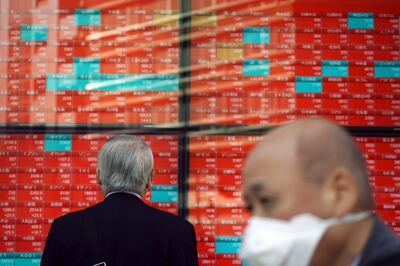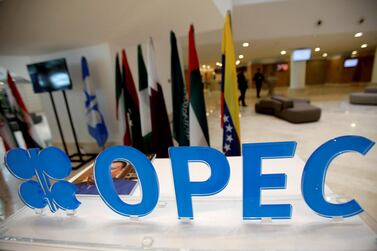Oil prices rose on Friday, heading for a fifth week of gains, after major producers agreed to continue to restrain production to cope with coronavirus-hit demand.
Brent was up 0.4 per cent at $48.89 a barrel after gaining around 1 per cent on Thursday. West Texas Intermediate also rose 0.4 per cent to $45.82 a barrel.
Opec and Russia, a group known as Opec+, on Thursday agreed to ease deep oil output cuts from January by 500,000 barrels per day, failing to come to a compromise on a broader policy for the rest of next year.
"They came up with the ultimate compromise," said Stephen Innes, chief market strategist at Axi.
Opec+ will meet once a month to review conditions and monthly increases will not be greater than 500,000 bpd.
"These meetings will bring some volatility to the market and, importantly, stand to make hedging harder for US producers," Mr Innes said.
It means the Opec+ is set to reduce production by 7.2 million bpd, or 7 per cent of global demand from January, compared with current cuts of 7.7 million bpd.
Opec+ was expected to continue existing cuts until at least March, after backing down from plans to raise output by 2 million bpd.
Meanwhile, the Asian shares scaled a record high on Friday on the growing prospect of a large US economic package, while hopes that vaccine rollouts will boost the global economy underpinned investor sentiment.
MSCI's broadest index of Asia-Pacific shares outside Japan rose 0.6 per cent, surpassing its November 25 peak, while Japan's Nikkei dipped 0.4 per cent on profit-taking.
In New York, the S&P 500 fell 0.06 per cent on Thursday, erasing earlier gains after the Wall Street Journal reported that Pfizer had slashed the target for the rollout of its Covid-19 vaccine due to supply chain obstacles.
Yet, the damage did not last long, with S&P500 futures gaining 0.3 per cent in early Friday trade.

A bipartisan, $908 billion coronavirus aid plan gained momentum in the US Congress on Thursday as conservative politicians expressed their support and Senate and House of Representatives leaders huddled.
“A deal before the year-end looked almost impossible a while back but now a package of around $1 trillion seems within reach," said Norihiro Fujito, chief investment strategist at Mitsubishi UFJ Morgan Stanley Securities.
On top of fiscal support, investors expect the US Federal Reserve to tweak its guidance of its asset purchase scheme later this month while the European Central Bank looks certain to increase its bond buying next week.
Progress in developing Covid-19 vaccines also led investors to bet a recovery in corporate earnings will accelerate next year, overriding any concerns about the current dire conditions of the pandemic.







